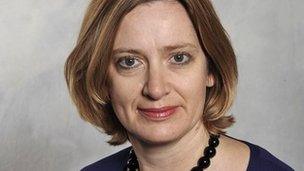MPs call for compulsory relationship education
- Published

The inquiry calls for relationship education to become part of the curriculum
A cross-party inquiry into Britain's high levels of unplanned teenage pregnancy is calling for compulsory relationship classes in schools alongside citizenship, BBC Newsnight has learnt.
The MPs say young people need to be taught about relationships as well as contraception.
The UK has twice the level of teenage pregnancy of France and Germany.
The government said it would be publishing its plans next year.
The inquiry by Amber Rudd MP (Parliamentary aide to Chancellor George Osborne), Liberal Democrat Lorely Burt and Labour's Sandra Osborne concluded that the teenage pregnancy strategy of the previous government had been a success, and should be resumed and extended to cover older age groups.
While the level of teenage pregnancy was brought down by the previous government's efforts - between 1998 and 2010 it came down by 24% - the numbers of babies born to women aged between 15 and 19 remains the highest in Western Europe.
The previous government's ambition to halve the teenage pregnancy rate was not realised.
Cultural shift
Experts told the inquiry that increased access to contraception had helped bring about the 24% reduction, but in order to make further progress there would now need to be an emphasis on relationship education.
The three MPs heard evidence from stakeholders across the profession, as well as young men and women about their experience.
Many agreed that while there was, in the words of their report, "plenty of information and availability of contraception... the relationship advice that should go with this is totally absent."
It is compulsory to teach sex education in biology classes, but it is not currently compulsory to teach sex and relationship education.
"This means individual schools determine how to approach delivery of it... if they do so at all," says the report.
The MPs say guidance on sex and relationship education (SRE) and personal social health and economic education (PSHE) is "confusing".
They believe that placing sex and relationship education within or alongside citizenship classes would help address the problem.
This would come under the PSHE aspect of the curriculum, which is currently being reviewed by the government. The MPs hope the government reflects their findings.
If their recommendations were taken up, it would bring about a cultural shift in Britain's schools towards greater discussion of young people's relationships.
"The evidence that we received showed that there is a high level of knowledge about contraception in young people, but a desperate absence of information about relationships," says Ms Rudd.
"We are calling for relationship education in schools to prepare young men and women for adult life," she adds.
Looking at the persistently high incidence of unplanned pregnancies in young people, the MPs' report says that although there are many reasons for unplanned pregnancy, the failure of school-led sex education to cover relationship guidance was a big element.
They recommend that the government should make SRE statutory to allow a more consistent and comprehensive programme with clear guidelines for schools, but allow flexibility in how they deliver it.
The report also recommends that teacher training for SRE is introduced so teachers can be confident in covering the subject.
Abortion rise
The inquiry finds that over the last decade there has actually been a "relative increase" in the level of unplanned pregnancy.

Amber Rudd wants to make contraception more accessible to prevent unwanted pregnancies
They show the age-standardised abortion rate (rate per 1,000) has increased by about 2.3%
They show the age average abortion rate increased by about 2.3%.
Abortion is very often the only perceived option of addressing an unplanned pregnancy.
The total number of abortions was 189,931 in 2011, 7.7% higher than in 2001.
"Whilst unplanned pregnancy in younger women is an important issue, there is strong evidence to demonstrate that not enough attention is being paid to unplanned pregnancy in older women," the report says.
The inquiry looked at the abortion rates in over-30s which has been rising and says that during the past three years the abortion rate in 30-34-year-olds has risen by about 10%.
To help tackle this trend, the inquiry argues there should be contraception given out - including in the workplace.
Ms Rudd also told BBC Newsnight that her party's debates about the current abortion age limit do not help the debate over how an individual should deal with unplanned pregnancies: "I do feel that the rising rates of abortion rates in this country are a cause for concern, and some of my colleagues in the Houses of Parliament think that the way to deal with that is sometimes to make access to abortion more difficult.
"My view is that the way to deal with that is to make access to contraception more effective... So that you don't have to go down that road."
She says having this conversation and discussing why women get pregnant can help provide better access to contraception and ultimately reduce the number of abortions, by making sure "young women don't get pregnant who don't want to".
"I think it is unproductive to constantly have a debate in the House of Commons about abortion.
"The right debate to be having is about to stop young women getting pregnant.
"To help them make the right choices for themselves... which is about self-respect and ambition to make sure that there is sufficient access to contraception so they can make those choices - in the way that is best for then.
A Department of Health spokesman said: "We will study this report carefully. We will publish our cross-Government plans on sexual health early next year, and this will include a focus on tackling unwanted pregnancies."
Watch Allegra Stratton's report on teenage pregnancy and the debate on Wednesday, 19 December 2012 at 22:30 GMT on BBC Two or afterwards on BBC iPlayer.